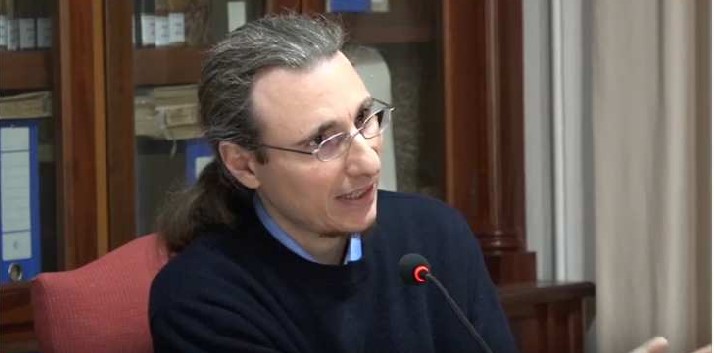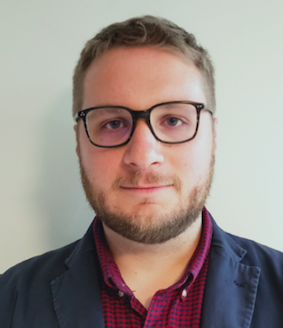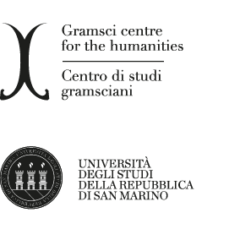To begin a discussion on the digital revolution in the humanities, we have asked some questions to our scientific advisors. Their answers will be published in eight issues. Here, as the eighth and last issue, Andrea Ricciardi and Damiano Garofalo.
Index
I) Agnese Accattoli and Davide Bondì;
II) Peter Burke and Elisabetta Benigni;
III) Marco Filoni and Erminia Irace;
IV) Lutz Klinkhammer and Matteo Melchiorre;
V) Donald Sasson and Luca Peretti;
VI) Jeffrey Schnapp and Paolo Varvaro;
VII) Giusto Traina e Michele Nani.
XV
Andrea Ricciardi
What generation do you feel you belong to?
I was born in 1969, so I grew up between the 1970s and 1980s. Actually, paradoxically, I feel I belong a bit to the seventies (that is, when I was a child) and a bit to the sixties (that is, when I wasn’t there). I think this comes from the fact that, for my passions and interests (first of all music, politics, cinema), the ’80s are a less stimulating phase, even if there are many exceptions, concentrated in the first part of the decade. It may be that my historical studies have reinforced this idea of decadence that I have felt since the late 1980s, but I believe that my little “consciousness” of the times, of historical caesuras, is not so artificial or constructed.
How and when did – in your personal experience – the digital revolution take place?
The first computer dates back to 1997-98, I had few mobile phones and only the corona virus has perhaps determined a small revolution. I don’t have a smartphone yet, I’m one of the two people I know who doesn’t have one yet and I feel I need to change my step. I have no doubt about the usefulness of certain tools. But the world that has been generated, a sort of “virtualization” of reality, bothers me a lot. I am totally distant from social media, it seems to me that almost everyone talks about almost everything and that, thanks also to the possibility of accessing a lot of information, skills are in crisis. It doesn’t seem to me a positive aspect of the era we live in.
Is the “old” way of working still present in your life? (for example: do you write by hand? do you use paper archives that you keep tidy? do you usually go to the library to read?).
Yes, at conferences I’ve always talked with only a pen trace, I speak off the cuff, with the obvious exception of quotations. I couldn’t live without a computer but, if I have to make a diagram and reflect on a topic, I find it clearer, quicker and more comfortable to do it on paper, using a pen. The same goes for notes if I am at a conference on the audience side. I don’t have paper archives, I go to the library and archive very willingly but I understand that, if used intelligently, the web is an important resource. Before it was impossible to control something with a click, this is certainly very convenient.
What do you think about the “digital” organization of scientific and cultural work? To what extent would you define the current way of working as new?
I think that, for historical studies, as I said, the net has represented an advantage on the whole but, if we consider the university “reforms” that push to publish a lot, it has also been the certification of the crisis of real research, the one focused on archive papers (not all of them digitalized) and aimed at safeguarding the problematic nature of the historical process, not at simplifying (when not trivializing) the dynamics of the past by reducing it on the categories of the present. A present that is now the “sovereign” temporal dimension: the past is not important, so it is difficult to imagine that it could affect the future. The speed and the spasmodic attention for the moment, connected with the new media of the digital era, have not produced an increase in the average quality of works, monographs and articles. Some new areas of contemporary history, not detached from the urgency with which society appears to me to be permeated, seem to me grotesque and useful to create professorships and careers rather than to explore the complexity of history. Finally, it seems to me that historical foundations and institutions are too marketing-conscious for survival reasons and have lost part of their charm. I would add that not necessarily popularizing means trivializing.

Andrea Ricciardi, historian of the University of Milan, biographer and tireless book reviewer, works on the Italian history of the second half of the 20th century, especially on the liberal-socialist and Action Party traditions.
XVI
Damiano Garofalo
What generation do you feel you belong to?
I think I belong to the generation born after the collapse of the Berlin Wall, which grew up in the nineties among the bright colors of Mickey Mouse and commercial television, which became “big” in the summer of 2001, celebrating the third Scudetto of Rome and watching on television the events of the G8 in Genoa and the attacks on the Twin Towers.
How and when – in your personal experience – did the digital revolution take place?
Between the end of the nineties and the beginning of the 2000s: I was used to watch mountains of movies on VHS, when my father gave me the Matrix DVD, I was shocked by the effect of high definition images. And I realized that the world was changing.
Is the “old” way of working still present in your life? (for example: do you write by hand? do you use paper archives that you keep in order? do you usually read in the library?)
I always write by hand to take notes at lectures, workshops and seminars, which I then often copy digitally. Also for reading I still prefer to use paper, so books and magazines, and sometimes I print pdf files to make reading easier. However, I can say that to work I usually use a “mixed” mode.
What do you think about the “digital” organization of scientific and cultural work? To what extent would you define the current way of working as new?
As far as research is concerned, I think there are very useful resources, for example the ease of being able to draw on texts in digital versions that were previously difficult to reach (especially through the introduction of open access). Moreover, the possibility to connect with people far away and create communications is certainly a scientific resource. From an educational point of view, I think there is a need to overcome the more or less immediate alienation generated by a mere transfer of lessons in the presence of the technological device. However, I think that this phase should invite us to fully rethink the ways in which we prepare lessons, involve students, assign exercises and evaluate their preparation. And I am convinced that these changes will come in handy, in a blended mode, even when lessons return in attendance.

Damiano Garofalo, a young scholar of La Sapienza, started out from studies of contemporary history, especially the social history of Italian television, and then widened his field of action to the history of cinema and film studies.

